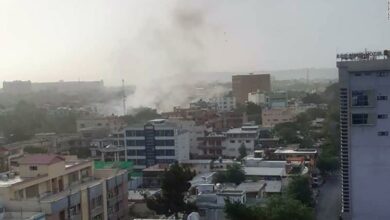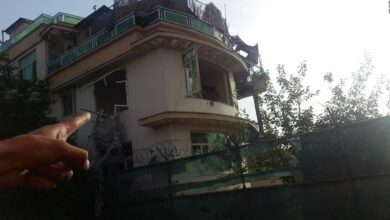The nature of the New Year Eve’s attack that targeted a Coptic church in Alexandria, leaving at least 21 killed in its wake, suggests Al-Qaeda culpability, Egyptian experts contend.
“We can easily see the fingerprints of Al-Qaeda,” Amr al-Shobaki, an expert on Islamic militant groups with Al Ahram Center for Political and Strategic Studies, told Al-Masry Al-Youm. “This is more professional than all terrorist acts that Egypt witnessed in recent years.”
Coptic worshippers were celebrating the holiday in St. Mark and St. Peter Church when an earth-shaking explosion was felt and heard outside. Eyewitnesses said the explosion a few minutes after midnight emanated from a bomb-laden car in front of the church. Later, the Egyptian police said the attack was most likely perpetrated by a suicide bomber.
“Al-Qaeda works in one of two ways,” said al-Shobaki. “It can cultivate a local cell with a limited number of militants or only one local person can endorse Al-Qaeda ideas. The link in this case would be Islamic Internet sites.”
The cyberspace is filled with radical websites that seek to propagate Al-Qaeda extremist beliefs. Some of these sites even carry recipes to build explosives.
Mohamed Abdel Salam, a security expert at Ahram, explains how the attack seems inspired by the Al-Qaeda paradigm.
“The fact that it is a suicide bombing carried out at a significant timing, against a sensitive target, with a large quantity of explosives shows that it is Al-Qaeda,” said Abdel Salam.
Abdel Salam argues local cells with regional agendas could be behind the recent blasts.
“These cells usually have a regional dimension as they get trained and guided by extremist elements in the region, namely from Gaza. Similar cells were responsible for Sinai bombings,” added Abdel Salam.
Many critics were wondering how such militants could get possession of large amounts of explosives. For Abdel Salam, the answer is simple.
“Getting explosives is not the issue because they are available,” said Abdel Salam.”We have remains of fighting in Sinai and landmines in the western desert. Besides, Gaza and Sudan are two neighboring spots that are full of weapons and explosives. Such explosives that could get smuggled [to Egypt] through the borders.”
Yet, his colleague al-Shobaki believes the blame should not be put on external factors.
“Egypt has always exported Jihadists to the rest of the region so we should not hold Gaza responsible,” said al-Shobaki
In 1990s, Egypt fought a fierce battle with two radical Islamist groups that were responsible for the killing of tourists, civilians and state officials. By the mid-1990s, the Mubarak regime succeeded in dismantling al-Jihad and broke the bones of al-Jamaa al-Islamiyaa, forcing its jailed leaders to renounce violence.
Since 1997, Egypt had not been hit by any terrorist attack until a series of explosions rocked Sinai in 2004. Thirty-four people were killed in car bombings that hit the Taba resort town and a tourist camp on 6 October as Egypt was commemorating its military victory in the 1973 Egyptian-Israeli war.
Back then, the government identified a Palestinian militant as the mastermind of the attacks. Less than a year later, as Egypt was celebrating the 53th anniversary of the 1952 revolution, another series of blasts hit the Red Sea resort of Sharm al-Sheikh, killing at least 88 people and injuring some 200. A group calling itself the Abdullah Azzam Brigades, representing Al-Qaeda in Syria and Egypt, claimed responsibility in a statement posted on an Islamist website shortly after the attacks. .
“Such organizations always choose sensitive targets to embarrass the regime and turn the masses against it,” said Abdel Salam.
The blast comes on the heels of threats directed at Egypt’s Coptic community made in late October by Al-Qaeda militants in Iraq. The militants vowed to stage attacks against Egypt’s roughly ten million Copts if the church refused to release Christian women allegedly held captive after converting to Islam.
While the government seeks to hold external forces responsible for the blast, many Copts as well as secular opposition leaders are holding the regime responsible, citing security laxity. Following the bloodshed, hundreds of Copts rallied in Alexandria to voice their anger against President Hosni Mubarak’s regime.
“There is definitely a security problem,” said al-Shobaki. “But the bigger problem has to do with the deterioration of Muslim-Christian relations and the indifference to pending issues such as civil rights and citizenship values.”
For decades, Copts have been complaining about different aspects of discrimination, including restrictions on the construction of churches, limitations on the number of Copts who could be attain senior public offices, and government indifference to Coptic demands to amend the Constitution to institute a civil order where Muslims and Copts enjoy equal rights.
The recent blasts came after a year marred by several sectarian disputes. In November, thousands of Copts clashed with police after the government decided to suspend the construction of a church building. Related violence resulted in two deaths. These clashes brought to the Coptic collective memory the drive-by shooting that left six Copts dead in Upper East in January 2010. As Coptic worshippers were coming out of the Coptic Christmas Eve mass, they were riddled with bullets in the southern province of Naga Hammadi.
“The portfolio of Muslim-Christian relations is already congested and inflammable. Such acts could add fire to fuel,” said al-Shobaki. “The repercussions of this act would be very dangerous and would exacerbate the tension.”
In its initial response to the bombings, the Coptic church expressed the same concern as al-Shobaki.
“As the church condemns the attack which threatens our security and the safety of our citizens, it also believes that the attack constitutes a serious escalation of sectarian violence against Copts,” the church said in a statement. “The attack came as a result of the continuous sectarian agitation that has been fuming in the last months.”




